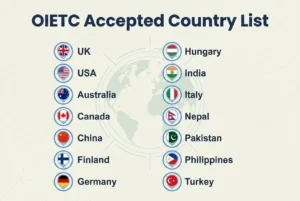The Canadian English Language Proficiency Index Program (CELPIP) is a general testing program. The CELPIP test covers the four components of the IELTS test, such as Reading, Writing, Listening, and speaking. However, the main difference between CELPIP and IELTS is that CELPIP mostly focuses on North American language, e.g., the listening and reading sections will contain more Canadian content.
CELPIP is not globally recognised as the IELTS, but it’s the best for those who want to obtain PR, citizenship and professional registration in Canada.
What is the CELPIP Test?
The CELPIP test, or Canadian English Language Proficiency Index Program, is a standardized test used to measure the English skills of people who are not native speakers, specifically in a Canadian setting. It was created by Paragon Testing Enterprises, a branch of the University of British Columbia, and is widely recognized in Canada. CELPIP is officially accepted by Immigration, Refugees and Citizenship Canada (IRCC) for immigration and citizenship applications, making it an important step for those who want to move to Canada.
Types of CELPIP
There are two types of CELPIP tests. For Canadian immigration, the CELPIP-General test is the one that is accepted. This test measures how well you can use English in everyday situations, ensuring immigrants have the language skills they need to communicate and fit into Canadian society. The CELPIP-General test focuses on practical, real-life situations to find candidates who can easily adjust to Canada’s diverse culture, which is why it’s important for the immigration process. The other test called the CELPIP-General LS, only checks listening and speaking skills and is accepted for Canadian citizenship applications.
The CELPIP Test Format
The CELPIP exam is a fully computer-based test with four sections: Listening, Reading, Writing, and Speaking.
- Listening: This part lasts about 47-55 minutes and has different types of questions. It tests your ability to understand conversations and talks in English, similar to what you might hear in Canada.
- Reading: This section takes 55-60 minutes and includes different types of reading tasks. The passages are made to check how well you understand written English used in everyday Canadian life.
- Writing: The writing section is 53-60 minutes and has two tasks. You’ll need to write an email and answer survey questions, similar to writing tasks you might have in daily life.
- Speaking: This part is about 15-20 minutes long and has eight tasks. You’ll be asked to do things like give advice, talk about personal experiences, and share opinions. The CELPIP speaking test is done on a computer, while the IELTS speaking test is done face-to-face with an examiner.
Advantages of CELPIP
The CELPIP tests are Canada’s top English tests for immigration and professional certification. Let’s explore some advantages of the CELPIP English test for international students.
Computer Based Test
CELPIP is a computer based English test, completed in one sitting and includes helpful tools like a timer, word counter, and spell-check.
North American Accent
Since IELTS is a worldwide test, you’ll hear different accents in the listening sections. However, everything is spoken clearly, without slang or difficult words. The language is simple and uses everyday vocabulary.
Quick Online Results
The result of CELPIP is available online 3-4 business days after the test date. The PDF score report is official and accepted by institutions.
Free Study Materials
You will get free sample tests, videos, online information sessions, preparation courses, and webinars if you take the CELPIP test.
What is the IELTS?
IELTS, which stands for the International English Language Testing System, is a test that measures English language skills. With over 4 million people taking it each year, IELTS is the world’s most popular test for those who want to study abroad or move to another country.
The test is created and managed by the British Council, IDP Education, and Cambridge Assessment English. IELTS is a widely accepted test for international students worldwide.
Types of IELTS Tests?
There are two types of IELTS tests. Such as: IELTS Academic and IELTS General Training. IELTS Academic helps you secure university acceptance, and student visas, and prove your English ability to professional organisations. On the other hand, IELTS General Training measures your English proficiency in the workplace and is often useful to prove your level when applying for a new position in an English-speaking company or organisation.
The IELTS Test Format
For the IELTS exam, you can choose either a paper-based or computer-based test. The test has four parts: Listening, Reading, Writing, and Speaking.
- Listening: This part is 30 minutes long and includes four recordings of native English speakers. You’ll answer questions to show your understanding of the main ideas, details, opinions, and attitudes, and to follow the ideas being discussed.
- Reading: This section lasts 60 minutes with three reading texts and 40 questions. The texts cover a range of styles, from descriptive to analytical. In the Academic test, the texts are similar to what students encounter in university. In the General Training test, the texts come from sources like books, newspapers, notices, and company manuals.
- Writing: This section is also 60 minutes long and has two tasks. In the Academic test, you’ll describe visual information (like a graph or chart) in Task 1 and write an essay in Task 2. For General Training, Task 1 requires you to write a letter, and Task 2 involves writing an essay.
- Speaking: The Speaking section is 11-14 minutes long and includes a face-to-face interview with an examiner. It has three parts: an introduction and interview, a short speech, and a discussion. This part may be scheduled on the same day as the other sections or up to a week before or after.
Advantages of the IELTS Test
IELTS is accepted worldwide. Taking IELTS has huge benefits for students who want to study abroad. Let’s explore some advantages of the IELTS test.
- Unlock New Opportunities: IELTS is trusted by 12,500 organizations in over 140 countries, so you can apply to study at top institutions worldwide.
- Grow Your Career: Show future employers your English skills with clear, secure results from IELTS.
- Work Internationally: The IELTS Listening section includes different accents and the Speaking section tests English used worldwide.
- Move to an English-speaking country: IELTS helps you prove to immigration authorities that your English level meets their requirements.
IELTS Vs CELPIP Test Format
Like IELTS, CELPIP also has 4 modules of testing such as: reading, writing, speaking, and listening. However, the test format is different.
CELPIP is only offered as a computer-based test, while IELTS provides both computer and paper-based options, along with IELTS Online, allowing you to take the test from home. The CELPIP General Test takes about 3 hours and is done in one sitting. The Listening, Reading, and Writing sections each take around 60 minutes, with a variety of passages or questions that require written responses. The Speaking section lasts up to 20 minutes, where you respond verbally to on-screen prompts.
The IELTS test is a bit shorter but has a similar setup for the Reading and Writing sections. The Listening part, however, is only 30 minutes, and the Speaking section is 14 minutes. In IELTS, the Speaking test involves a face-to-face interview with an examiner, either in person or via video. This test uses everyday English and is intended for general use, not for academic purposes.
There is also an Academic version of IELTS, with a similar format and length, but it includes content from books, academic journals, magazines, and newspapers, similar to what you would encounter in a university setting.
CELPIP Vs IELTS World Recognition
CELPIP is mainly recognized in Canada and is designed specifically for use there, so it’s not as widely accepted in other countries. IELTS, on the other hand, has been accepted by Immigration, Refugees and Citizenship Canada (IRCC) since 2005 and is also trusted by other major governments that require an English test.
IELTS is recognized by over 11,500 universities, immigration offices, government agencies, and employers in more than 140 countries. Most importantly, it’s accepted for studying, working, and immigration in Australia, Canada, New Zealand, the UK, and the USA.
IELTS Vs CELPIP Which One is Fair?
In the CELPIP test, the Listening and Reading sections are graded by a computer, while the Writing and Speaking sections are marked by an examiner. In IELTS, all four sections—Listening, Reading, Writing, and Speaking—are marked by human examiners. The same examiner grades your Listening, Reading, and Writing, while a different examiner handles your Speaking test.
Having a person conduct your Speaking test in IELTS means they can clearly understand your accent. Plus, you can see their facial expressions and social cues, which can help you perform better.
CELPIP Vs IELTS Which One is the Best for You?
Comparing CELPIP to IELTS isn’t exactly equal, as IELTS is accepted worldwide, including in Canada, while CELPIP is only recognized in Canada. So, choosing the right test depends on your needs. If you’re applying to Canadian universities, you can take either CELPIP or IELTS. For studying or working in other countries, IELTS is the better choice since it’s accepted in many places worldwide.
| Why Take the CELPIP Exam? | Why Take the IELTS Exam? |
| Test takers looking for Canadian immigration should opt for CELPIP | Candidates looking to take a test that is accepted globally for various study or immigration options |
| Candidates who prefer a computer-based exam with a focus on everyday Canadian English | If you need a test that’s accepted worldwide for study or immigration, IELTS is a good choice. |
| Candidates who are comfortable with short, task-based speaking sections | It also offers many study resources for studying abroad, making it easier to prepare. |
Final Words
Recently, Immigration, Refugees and Citizenship Canada (IRCC) updated the English test requirements for the Student Direct Stream (SDS) study permit. Starting August 10, 2023, students taking the IELTS Academic test no longer need to score 6.0 in each section. Now, they only need an overall score of 6.0 to meet the English requirement for SDS. However, CELPIP is also the best option if you want to study in Canada for a long time. To get more information regarding CELPIP and IELTS, you can always contact AIMS Education.





